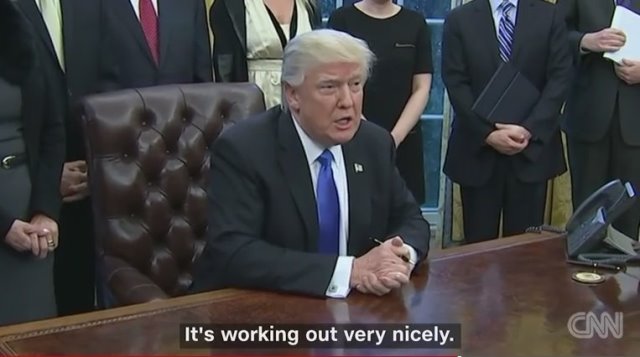Muslim-Americans in Dearborn, Michigan are split in their support of President Donald Trump’s recent executive order on immigration, with some set to defend it and others organizing protests.
Lebanon-born Muslim Nedal Tamer is adamant in his support for the President.
“I say to the Muslims here in Dearborn, they should have more confidence in Trump,” Tamer said. “Trump is going to protect them.”
The 40-year-old immigrant realizes he is likely in the minority of Muslims for his continued support of Trump.
Tamer, who cast his ballot for Trump, is still standing by the 45th President, even after his executive order banning citizens of seven Muslim-majority countries from entering the United States for the next 90 days, suspending the admission of all refugees for 120 days and indefinitely ending the Syrian refugee program.
“They shouldn’t worry because the order, it’s not against the Muslims,” Tamer said. “We have 67 nations, Muslim nations. All of them can come here.”
Tamer believes the order will help thwart terrorism, which will ultimately benefit the Muslim community.
“We have a big threat from ISIS, and the President is doing the right thing,” Tamer said.
Tamer is the owner of his own construction company, Tamer Builders, and told CNN in November that he voted for Trump because he admired the billionaire’s business savvy.
“Mr. Trump should be held as an image of the American dream,” Tamer had said.
He’s not the only Muslim in Dearborn trying to reassure his community.
Twenty-three-year-old Mike Hacham said: “I still stand by most of the things that he’s doing.”
Hacham is an active community leader in this city where more than 40% of the residents are Arab-American, a majority of those Muslim. In fact, Hacham is the first Muslim to be elected as a precinct delegate in Dearborn. But his active campaigning for Trump has now forced him to be on defense with community members.
“It does put me in a very tough position,” he said. “They say, ‘Hey, he’s going to start deporting Muslims out of this country.’ I said, no, he’s not. You guys are safe.”
But Hacham is not fully behind Trump’s travel ban. He believes it’s far too expansive and should be more narrowly written to include what he sees as the real threats, like the countries where the September 11 attackers originated.
Those countries include Saudi Arabia, the United Arab Emirates, Egypt and Lebanon — none of which are currently covered by the order.
“I want to see the executive order reworded … in a way that protects the homeland,” Hachem said.
Hacham said he hoped he could show the President around so he could meet with members of the community first-hand.
“I wish Trump would come to Dearborn. I’d be more than happy to show him around, take him around, show him how we live,” he said.
U.S. Senator Gary Peters also sent a letter to Homeland Security Secretary John Kelly Monday inviting him to the Detroit-area to meet with Arab-American leaders; Secretary Kelly has not yet responded.
Muslims all over Michigan, however, are beginning to mobilize against Trump’s travel ban — holding emergency town halls with the dual messages of “resist” and “know your rights.”
At the Lebanese American Heritage Club, dozens gathered to hear community leaders explain the practical effects.
Fayroud Saad, 33, is a Muslim whose parents immigrated from Lebanon. She works in the Detroit mayor’s office dealing with immigrant rights and is actively involved in all of the town halls happening in her community.
Immediately after the election, she told CNN she was angry about the outcome, but said she was still hopeful about the protections of democracy. Now, however, her sentiments have changed.
“I still think about how I said I wasn’t fearful,” Saad said. “I guess I’ve become a little more and more fearful, in terms of not knowing what’s next. What’s the next thing we have to react to and that we have to worry about?”
Recent University of Michigan-Dearborn graduate Mohammad Emari is also afraid.
The 23-year-old is a United States citizen whose parents hail from Iran. But Emari is engaged to a woman with dual citizenship in Iran and Canada, who currently lives in Toronto. Emari had plans to see her this week, but now their plans are canceled since his fiancee is afraid to attempt to cross the border even though she is a Canadian citizen.
Emari, too, refuses to cross into Canada, despite his US citizenship.
“I’m scared to go myself, even though I am a citizen, even though I was born here,” Emari said. “I’m scared I’m going to be stopped for no reason.”



